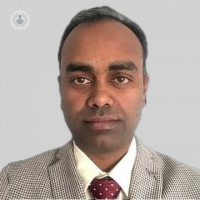Sleep disorders associated with psychiatric and neurological conditions, and their symptoms
Written in association with:
Sleep disorders are common in individuals with neurological and psychiatric conditions, and they can significantly affect a person’s quality of life. These disorders can disrupt regular sleep patterns, lead to persistent tiredness, and worsen the symptoms of the underlying condition.
In this article, leading consultant psychiatrist in liaison and neuropsychiatry, Dr Mohan Rathnaiah discusses how addressing sleep issues is vital for improving both physical and mental health.

Neurological conditions and sleep issues
Various neurological conditions can cause significant sleep disturbances:
-
Parkinson’s disease: Individuals with Parkinson’s often experience sleep disruptions due to symptoms like tremors and stiffness, making it difficult to turn in bed. They may also suffer from REM sleep behaviour disorder (RBD), where they physically act out dreams, which can cause injury. These disturbances often lead to feeling restless or anxious all the time, further disrupting sleep.
-
Multiple sclerosis (MS): Fatigue is a common symptom in people with MS, and many experience insomnia, restless leg syndrome, or periodic limb movements. The neurological damage caused by MS disrupts the brain's regulation of sleep-wake cycles, contributing to poor sleep and, consequently, daytime drowsiness.
-
Epilepsy: Seizures can occur during sleep, interrupting rest and leading to insomnia or excessive daytime sleepiness. Some anti-seizure medications can also contribute to difficulty sleeping. People with epilepsy may feel constantly anxious about having seizures during the night, further affecting their ability to rest.
How are psychiatric conditions and sleep issues connected?
Psychiatric conditions are often closely linked to sleep problems:
-
Depression: Sleep issues are a key symptom of depression. Individuals may find it difficult to fall asleep, stay asleep, or wake up too early. Feeling restless or anxious all the time can make it even harder to achieve restful sleep. In some cases, depression can cause excessive sleep, but in most, insomnia worsens the condition.
-
Anxiety disorders: Anxiety often manifests in difficulty falling or staying asleep, or waking up frequently during the night. Feeling restless or anxious all the time prevents individuals from reaching deep, restorative sleep, leading to exhaustion during the day.
-
Bipolar disorder: During manic phases, individuals with bipolar disorder often have a reduced need for sleep, while depressive phases may lead to insomnia or hypersomnia. The emotional highs and lows make it hard to maintain a regular sleep pattern, and the constant feelings of restlessness during mania further complicate sleep.
-
Schizophrenia: Disrupted sleep is common in schizophrenia, often due to disorganised thoughts, hallucinations, or medication side effects. People may find themselves waking up multiple times during the night, feeling restless or anxious all the time, which leads to fragmented sleep.
How do sleep disorders manifest in ADHD, autism, Parkinson's disease and dementia?
Initial insomnia such as 'brain not able to switch off' is commonly seen in people with impulsive-compulsive spectrum conditions of brain such as ADHD.
REM sleep disturbance including vivid dreams and acting out dreams can be commonly seen in multiple brain conditions including ADHD, autism, Parkinson's disease and dementia.
Effective medications are available to treat such insomnia and REM sleep disturbance.
The importance of addressing sleep issues in these conditions
Addressing sleep disorders is crucial for managing neurological and psychiatric conditions. Poor sleep can worsen symptoms, reduce cognitive function, and impact overall well-being.
However, treatments like cognitive behavioural therapy, medication or lifestyle changes can improve both sleep quality and symptom control. Furthermore, many of the prescribed medications might contribute to sleep disturbance particularly when taken in the night and hence a comprehensive medication review along with assessment of cluster of symptoms would be beneficial rather than focussing on diagnostic label.
Early intervention and working with a neurologist or psychiatrist can help patients manage their condition more effectively.
Looking for expert psychiatric support regarding sleep disorders? Arrange a consultation with Mr Rathnaiah via his Top Doctors profile.


